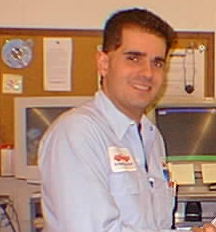Giammalvo Files

Mark Giammalvo specializes in driveability
diagnostics at his family
business, Sam Giammalvo's Auto Sales & Service,
Inc. in New Bedford,
MA.
Mark, who has been with the business for
over 20 years, is an ASE
Master Technician and Parts Specialist. He also holds the ASE
L1 certification, and has an associates degree
in business management.
Mark is also a writer for Motor Age Magazine
and is the past secretary of the Alliance of Automotive Service
Professionals, (AASP).
|

Asking All The Right Questions
(Printed in the Journal
of The Alliance of Automotive Service Providers, AASP)
Asking all the right questions.
Sometimes your service customers can be very helpful at assisting you in
solving their car’s repair woes. Other times, some customers will make you
pry the information out of them. It can be as if they think, the more
you know, the more the expensive the repairs will be. In the end, the lack
of information given can result in more labor, testing, and expense.
Fortunately, late this spring, we had a service customer that gave us information
from the start that led us to quickly find her driveability problem. The
vehicle in question was a 2001 Honda Accord with 57-k miles. The customer
stated that her car would start, barely idle and stall if the transmission
was placed in gear. The customer was helpful enough to add that she had recently
purchased fuel and was not sure if this was related to the problem.
Upon inspection, our technician found that the Honda’s engine would idle,
better if at operating temperature, and would then stall if accelerated or
placed in gear. The air cleaner box and filter were clear and the engine
could be accelerated if we substituted propane. A scan tool connect reveled
‘no codes present’ which was no big surprise. A tap into the fuel line reveled
that fuel pressure and volume were both normal. Question was, was this really
gasoline that we were testing the pressure and volume of?
We then took our fuel quality tester and tested for water, excessive ethanol/methanol
and fuel vapor pressure. The test results showed that the vapor pressure
of the liquid coming through this Honda’s fuel lines indicated it contained
a high concentration of ethanol or methanol. We then removed the fuel sender
assembly from the trunk access plate and pumped out the questionable
fuel. As soon as a known good supply of gasoline was added to the tank,
the vehicle started, drove and accelerated normally.
When questioned further, the customer stated that, earlier in then day, she
had gone to a gas station here in the city that had just reopened after being
closed for several years. We contacted this station to advise them of what
had happened to our customer with the Honda. The response we received was
something to the effect of: ‘Our gas ok . . . no troubles with our gas’.
Now it was time to give the customer the repair bill and then, there was
that nagging little question . . . What are we going to do with two drums
of this junk, (hazardous waste), that we had just pumped out of her tank?
The customer was presented with our bill, mostly labor at just over six hours,
including a non-related fuel repair that she had also requested. The customer
then drove to the station the next day and observed what appeared to be a
crew pumping liquid out of one of the in-ground fuel tanks and a sign on
the station stated that they were currently not selling gasoline. The customer
then showed the station manager our repair bill. Fortunately, the manger
was honest and stated that they had a fuel quality issue and that their insurance
company was going to reimburse her for the repairs. Even better yet, several
days later, an employee from the station came by and picked up the two barrels
of contaminated fuel.
Although fuel quality problems are not that common in the daily routine of
the auto repair world, those fuel problems are still out there, and, on occasion,
they will enter your service bays. Since it is the last thing typically tested,
fuel quality issues can be a real time consuming bear to solve. In the past,
we have had customers that have encountered driveability problems shortly
after refueling but have neglected to tell us that they had recently purchased
fuel. Since most engines are presumed to have a known good supply of air
and fuel, you can wind up performing tests that can lead you in other diagnostic
directions, thus adding to the invoices labor total.
In the end, it is probably beneficial to ask all driveability service customers;
when they last purchased fuel and how that purchase relates to the driveability
issue they are having.

|